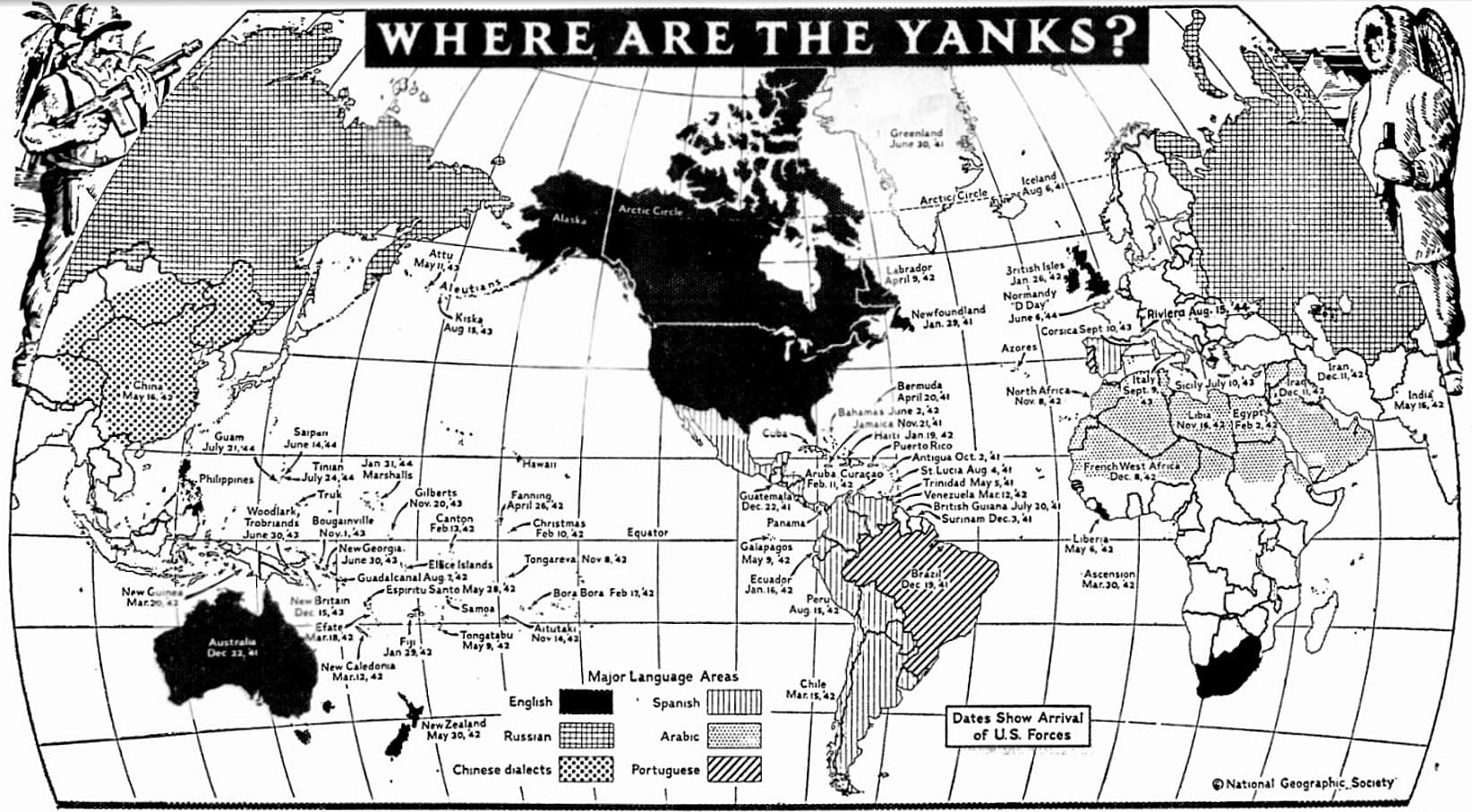With four spearheads –
Allied troops only 14 miles from Lyon
Gain of 34 miles made in 24 hours
…
Big guns being sent back to Reich
…
By Eleanor Packard, United Press staff writer
…

Chicago, Illinois (UP) – (Sept. 2)
Herbert Brownell Jr., chairman of the Republican National Committee, believes that a switch of only about four percent of the vote cast in 1940 will be necessary to elect Governor Thomas E. Dewey Nov. 7.
The GOP chairman said:
There is a much greater defection for the New Deal, particularly in Texas and the border states than is indicated on the surface.
Stroke proves fatal to ‘father of TVA’

George Norris
McCook, Nebraska (UP) – (Sept. 2)
Former Senator George William Norris, one of the nation’s most distinguished statesmen, died tonight after suffering a cerebral hemorrhage and paralytic stroke Tuesday. He was 83.
Mr. Norris, known as “father of the TVA” and the “great insurgent,” was stricken in the little stucco home, where he had lived since he was defeated in his bid for a sixth term in the Senate to which he was elected after having served earlier in the House – a total of 40 years in Congress.
Funeral tomorrow
He was the last of six Senators who voted against American entry into World War I.
Funeral services will be held Monday at the McCook Congregational Church. The rites will be conducted by the Masonic Lodge.
In Washington, President Roosevelt described the death of Mr. Norris as “a national bereavement” and said that “a grand old champion of popular rights has made his journey.”
First elected in 1902
Mr. Norris had a record of 40 years of continuous service on Congress, beginning in 1902 when he was elected to the House and ending in 1942 when he was defeated for reelection to the Senate by Kenneth S. Wherry.
For 33 years, he was a Republican, but for the last six he was an Independent. He achieved his first national prominence in his fight against what he claimed was the one-man rule of the House by Speaker Joe Cannon, a battle he won in 1910.
His battle against “Cannonism” led to his election to the Senate in 1912.
With La Follette Sr.
In the Senate, Mr. Norris aligned himself with Senator Robert M. La Follette Sr., and became one of President Wilson’s “little group of willful men” who defeated the war President’s bill to arm American merchant ships.
He also sided with Mr. La Follette in voting against American entry into the war, a vote that almost cost him his seat in the Senate.
During his long years in Congress., he attained a high record for constructive, liberal legislation, the most notable of which was the Tennessee Valley Authority Bill, which he sponsored. His greatest monument is Norris Dam, the first to be constructed by the TVA. A town near the dam site was also named Norris.
Champion of labor
An advocate of cheap electric power for the public, Mr. Norris also sponsored the Rural Electrification Act designed to bring power to farm homes. The bill was passed in 1937.
A champion of labor legislation, he backed the Norris Act of 1932 which restricted the use of injunctions in labor disputes, outlawed “yellow dog” labor contracts, and guaranteed labor the right to organize and bargain collectively.
Mr. Norris also waged and won a one-man fight to liberalize state government and was instrumental in the establishment of a unicameral legislature in Nebraska.
Abandoned ‘lame ducks’
He also sponsored the “lame duck” amendment to the Constitution which changed the date of inauguration of the President from March 4 to Jan. 20.
The amendment, which abolished the “lame duck” session of Congress was adopted in 1933.
Although Mr. Norris opposed America’s entry into World War I and into the League of Nations, his views on international affairs changed before the present war and in 1941, he voted for a declaration of war against Japan.
He also changed his mind about international cooperation. He approved membership in an international society for peace and cooperation.
Explains change
“Changed circumstances demanded a changed attitude,” he said.
Warren G. Harding was the last Republican Mr. Norris supported for President. In 1924, he campaigned for Senator La Follette Sr., who ran on a third-party ticket. He supported Democrat Alfred E. Smith in 1928 and after 1932 he was an outspoken supporter of President Roosevelt. Shortly before his death, he said he would support the President for a fourth term.
Mr. Roosevelt also admired Mr. Norris and in 1936, he said Nebraska should keep Mr. Norris in the Senate as long as he lived. He reiterated his endorsement in 1942 when Mr. Norris was running unsuccessfully for his sixth term.
‘Never told lie’
Mr. Norris said that throughout his long Congressional career his “lips have never told a lie and my hands never touched a bribe.”
He was born July 11, 1861, at Clyde, Ohio, and attended Baldwin University, Northern Indiana Normal School and Valparaiso University. He was admitted to the bar in 1883. He was married to Pluma Lashley at Beaver City, Nebraska, in 1890. She died in 1901 and two years later, he married Ella Leonard of San Jose, California. His widow and three daughters survive.
WLB fact-finding panel, after lengthy hearings, favors raising wages
By Edwin A. Lahey
…

After five years of global warfare, the sun now never sets on U.S. troops. They are scattered over the face of the Earth.
It was exactly five years ago today (Sept. 3, 1939, also a Sunday) that England and France declared war on Germany. The Germans had invaded Poland on Sept. 1, officially calling their action a “counterattack with pursuit.” Britain and France, finally abandoning their policy of appeasement, sent an ultimatum to Hitler that if he did not recall his forces they would go to war in her defense.
War seemed far away to Americans when, on Sunday, Prime Minister Chamberlain announced to Commons that Great Britain was at war with Germany and then France later in the day followed suit. That night, the steamship Athenia, bound for Montréal with refugees from war zones, was sunk by an explosion 200 miles northwest of Ireland, with a loss of 112 lives. Three hundred of the passengers were Americans.
Americans felt secure under a neutrality law which provided a “cash-and-carry” system for sale of war supplies to belligerents. We had a standing army smaller than the forces that invaded Normandy and it was not uncommon for troops in maneuvers to use broomsticks and trucks to simulate guns and tanks. We were little armed than the French Maquis now coming to the assistance of two invading U.S. armies.
On Sept. 4, Japan announced that “Japan does not intend to be involved in it” and the next day President Roosevelt issued two proclamations announcing neutrality and putting an embargo on shipments of arms to the belligerent countries.
Most Americans had never heard of such strange places as Guadalcanal and Saipan or dreamed that their sons and brothers would soon be stationed in Greenland and the Aleutians and Burma and Iraq and fighting bitter battles in Italy, France, New Guinea, Bougainville and North Africa.
Yet by April 20, 1941, nearly eight months before Pearl Harbor, U.S. troops were in Bermuda and the next June, they were in Greenland, as this map by the National Geographic Society shows. For war was inexorably moving toward America and we were advancing to protect ourselves.
Japan struck us on Dec. 7, 1941, and Germany and Italy promptly declared war against the United States.
This map shows how our forces have spread throughout the world, giving the location and landing date of the various troop concentrations.
Workers cite gains, losses during year
By William Forrester
…
By Henry T. Gorrell, United Press staff writer
…
High road to Belgium path of flowers, tears and blood; drive 60 miles in 24 hours
By Richard D. McMillan, United Press staff writer
…

Politicians agree Gallup figures for state, 52% Roosevelt, 48% Dewey, are about right
By Kermit McFarland
…
…
Political gap between ‘haves’ and ‘have-nots’ narrowing in 1944 presidential campaign
By George Gallup, Director, American Institute of Public Opinion
…